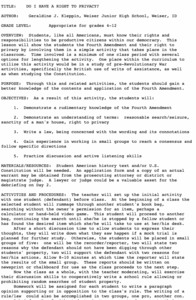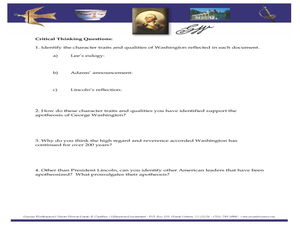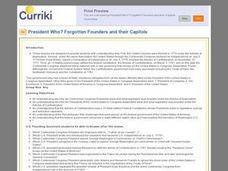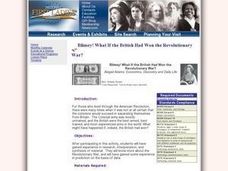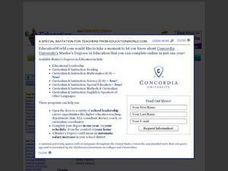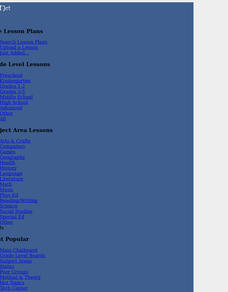Curated OER
Cornplanter and the Fate of His Land
Students explore Chief Cornplanter and his importance as the leader of the Seneca tribe. In this Chief Cornplanter lesson, students examine how the Seneca land was taken over by the right of eminent domain. Students answer...
Curated OER
Survey of the Louisiana Purchase in 1815
Students explore the survey of the Louisiana Purchase by creating their own surveying and mapping techniques such as natural maps, pace maps, and orienting. Other students then try to follow the maps.
Curated OER
Creative Convincing
Young writers will love examining Click, Clack, Moo: Cows that Type for examples of good persuasive writing. Generally, when we write persuasive pieces, there are common words we use. Encourage your writers to...
Curated OER
Do I Have a Right To Privacy?
Students, in groups, explore the Fourth Amendment and their right to privacy. They explore reasonable search/seizure, sanctity of a man's house, right to privacy.
Curated OER
Stamp Act: Virtual Representation vs. Actual Representation
Eleventh graders research and discuss the different points of view of colonists in terms of taxation, as well as how these viewpoints helped lead to the revolution.
Curated OER
George Washington as Military Leader
Students will analyze historical evidence including primary sources to evaluate George Washington as a military leader. The reading begins with Washington's understanding of the issues related to military power, continues with his use of...
Curated OER
Federalism
Students become familiar with the Federalist papers and the work of the federal government. In this federalism lesson, students find similarities and differences between state and federal government.
Curated OER
Bill of Rights Day
Fifth graders examine and identify the values and purposes of the Bill of Rights. They complete a class KWL chart, participate in a class jigsaw activity, write and illustrate a book about the first ten amendments, participate in a mock...
Curated OER
Family Life in the Federal Period
Eleventh graders explore the evolution of a small New England town, Deerfield families and diversity of jobs in a town. They also explore how families functioned and how the roles of women changed.
Curated OER
The Apotheosis ofGeorge Washington
Students examine the image of George Washington. In this Washington presidency lesson, students use the provided analysis handout to analyze the character of Washington conveyed in several pieces of art and speeches. Students share their...
Curated OER
Understanding the Declaration of Independence
Students identify and interpret the Declaration of Independence and the rights and privileges demanded in the document. They also identify how those rights and privileges have affected our history. Students then research about the...
Curated OER
President Who? Forgotten Founders and Their Capitols
Students explore the beginning of the United Colonies that were formed in 1774. In this history lesson, students discuss the Articles of Confederation and then answer questions about the events surrounding the development of the...
Curated OER
What Made George Washington a Good Military Leader?
Students list qualities they believe made George Washington an effective military leader. They discuss some difficulties Washington faced as Commander-in-Chief and describe his response to the Newburgh Conspiracy.
Curated OER
Territory and Statehood of Iowa
Fifth graders recognize the steps to create a territory, a district and a state. In this Iowa activity, 5th graders discuss the three capitals and their importance. Students recognize the key people in the development of...
National First Ladies' Library
Building a Federal Town: Washington, DC
Young scholars create a timeline of the history of Washington, D.C. from 1787 to 1879. Using the internet, they read specified articles about the design of the capital and city of Washington DC. Students write a newspaper article about...
Curated OER
Phoebe The Spy
Fourth graders read the book, Phoebe The Spy, by Judith Berry Griffin. They complete comprehension activities, make predictions about what happen next, and create a PowerPoint book report for the story.
Curated OER
Breaking Down the Declaration of Independence
Students examine the Declaration of Independence. In this colonial America lesson, students analyze the three sections of the Declaration and determine the beliefs the founding fathers had about rights.
Curated OER
Native Lands: Indians in Georgia , Losing Ground: Removal, 1802-1838
Students investigate the removal of the Creek Indians from Georgia. Students read the story of the Creek removal from Georgia, locate sites mentioned on a map, and create a related timeline. Students share their thoughts on the Creek...
Curated OER
Minutemen and Paul Revere's Ride
Fifth graders listen to a discussion on the Minutemen and Bunker Hill and learn about Paul Revere's ride. In this Minutemen lesson plan, 5th graders take a quiz on the information and play a Yankee Doodle game.
Curated OER
Different Viewpoints - Loyalist or Patriot
Third graders use primary sources to study U.S. history and government. In this primary sources lesson, 3rd graders practice gathering information from "eye witness" accounts of history.
Curated OER
Celebrating Benjamin Franklin
Students explore various websites featuring the life and achievements of Benjamin Franklin. They investigate Franklin's roles in colonial society as well as pictures of his various inventions. They view excerpts of historical documents...
Curated OER
"And That's The Way It Is..." Today in History
Students research an event in history from different perspectives. They discuss the characteristics of a nightly news broadcast and create their own based on the history event they researched. They work together to produce this...
Curated OER
Stamp Act
Fifth graders write about the Stamp Act and pretend they are being taxed by the British and write how they feel. For this Stamp Act lesson plan, 5th graders view a taxation simulation.
Curated OER
Keeping verb tense consistent (Middle, Reading/Writing)
Students improve their personal and academic writing by use of one consistent verb tense.



